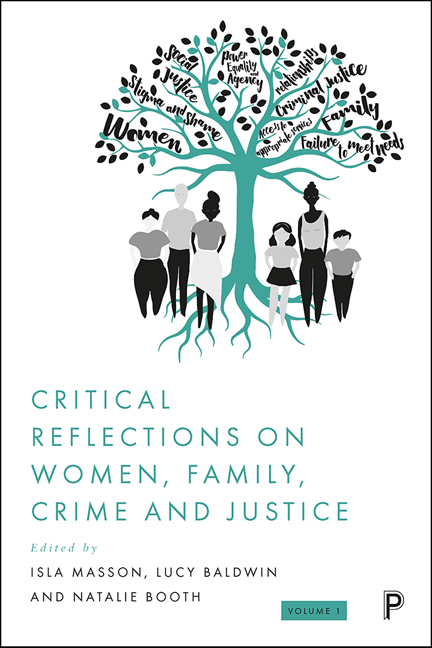Book contents
- Frontmatter
- Contents
- List of figures
- Notes on the contributors
- Acknowledgements
- Foreword: critical reflections from the Women, Family, Crime and Justice network
- 1 Starting the conversation: an introduction to the Women, Family, Crime and Justice network
- 2 Playing the game: women and community punishment
- 3 Harmful social and cultural practices that exist within South Asian communities in the UK and their impact on women
- 4 Exploring shame, love and healing within women’s recovery: an analysis of a trauma-specific intervention
- 5 Reducing the enduring harm of short terms of imprisonment
- 6 ‘Without it you’re lost’: examining the role and challenges of family engagement services in prisons
- 7 What are the challenges and opportunities for schools in supporting children of people in prison?
- 8 Impact and engagement work in the context of families of people in prison
- 9 Presence, voice and reflexivity in feminist and creative research: a personal and professional reflection
- 10 Service users being used: thoughts to the research community
- 11 Continuing the conversation: reflections from the Women, Family, Crime and Justice network
- Index
10 - Service users being used: thoughts to the research community
Published online by Cambridge University Press: 21 December 2021
- Frontmatter
- Contents
- List of figures
- Notes on the contributors
- Acknowledgements
- Foreword: critical reflections from the Women, Family, Crime and Justice network
- 1 Starting the conversation: an introduction to the Women, Family, Crime and Justice network
- 2 Playing the game: women and community punishment
- 3 Harmful social and cultural practices that exist within South Asian communities in the UK and their impact on women
- 4 Exploring shame, love and healing within women’s recovery: an analysis of a trauma-specific intervention
- 5 Reducing the enduring harm of short terms of imprisonment
- 6 ‘Without it you’re lost’: examining the role and challenges of family engagement services in prisons
- 7 What are the challenges and opportunities for schools in supporting children of people in prison?
- 8 Impact and engagement work in the context of families of people in prison
- 9 Presence, voice and reflexivity in feminist and creative research: a personal and professional reflection
- 10 Service users being used: thoughts to the research community
- 11 Continuing the conversation: reflections from the Women, Family, Crime and Justice network
- Index
Summary
Introduction
The pains of imprisonment are well documented by researchers. As far back as 1862, depictions of women in prison were dominated by portrayals of weak and vulnerable individuals such as Mayhew's (in Zedner, 1998, p 298): ‘In them one sees the most hideous picture of all human weakness’.
The pains of women's imprisonment, looking at the contemporaneous and longitudinal (through the lens of largely negative) impact on their health and wellbeing, their family life, their mothering identity, stigma and relationships are rich areas of academic research. Thus, women who have experienced the criminal justice system are much sought after as research participants. We start this contribution with a direct question to the research community. Where are the authored pieces of research by those who have lived it? Indeed, where are the co-authored pieces with you? We would ask you to pause and reflect before reading on.
As two women with the lived experience of being both in prison, and being former participants in various research projects, four times respectively, we intend in this contribution to shine a light on the lived experience of being researched, examining researcher–participant relationships, power, purpose, ownership and ethics. In doing so, we raise questions over the equity and ethicality of research with criminalised women. This contribution delves into our concerns that women's collective and personal experiences of pain are often subjected to being used, manipulated and repackaged – often without our direct knowledge and indeed without actual real consent – mostly leaving marginal benefit and minimal impact on the actual lives of the criminalised women themselves nor on the wider structural conditions under which we labour.
The intention for this contribution is to lean back into our positions as research subjects and to reflect on the impact of these experiences, on our lived, living and real lives. It is through reflection, collectively and individually, that we continue to develop our understanding about the radical and humanistic changes needed to ensure safe, reciprocal and useful participation – participation which more often than not positions us (the community of the researched) as ‘useful’ for a limited time, and results in reputational development for academic institutions and individual validity for the researcher. As part of this process, the researched are left behind as a footnote; ‘with thanks to our participants’.
- Type
- Chapter
- Information
- Critical Reflections on Women, Family, Crime and Justice , pp. 199 - 218Publisher: Bristol University PressPrint publication year: 2021

